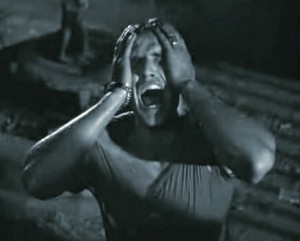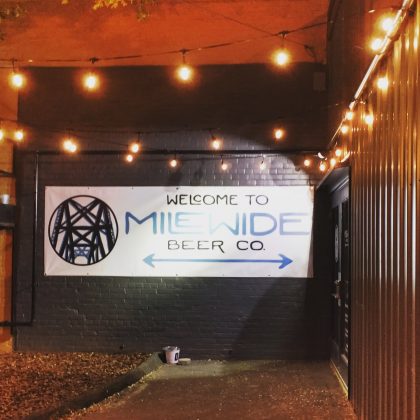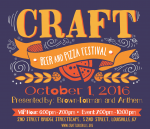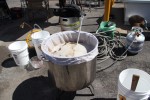 I freely admit to getting no kick out of juleps. Horse pimps don’t thrill me at all, and the fireworks during Flatulence Over Louisville are an excellent annual pretext to skip town for somewhere that’s both quiet and civilized by comparison, and which has craft beer readily available to wash away the bad taste of the air show’s martial glorification of pure garishness.
I freely admit to getting no kick out of juleps. Horse pimps don’t thrill me at all, and the fireworks during Flatulence Over Louisville are an excellent annual pretext to skip town for somewhere that’s both quiet and civilized by comparison, and which has craft beer readily available to wash away the bad taste of the air show’s martial glorification of pure garishness.
Nowadays the year-round availability of locally-brewed beer in Louisville is something we take for granted, but unfortunately, the Kentucky Derby isn’t really about anything other than thoroughbred horses, gamblers and maybe the Ohio River filled with bourbon – as long as you keep that accursed mint out of it, and take it neat, the way your personal deity intended.
All of this is to concede the obvious: The Kentucky Derby has its own traditions, as befits an event that has taken place each year since 1875. That’s fair enough, even if local beer hasn’t always been prominent among them.
Of course, back in the old days there’d have been plenty of local beer to celebrate the Run for the Roses, at least until the idiotic onset of Prohibition, and then once again after glorious Repeal. After the original Falls City disappeared in 1979, there wasn’t a single drop of beer from here with to presage a wager until 1993, when Sea Hero’s triumph was marked by a few hardy and pioneering microbrew fans drinking Silo Red Rock Ale.
For me, Pavlov’s notorious canine (quite possibly he was a racing greyhound) always comes to mind during the waning days of April, when crowds of revelers – many of whom surely know better – inexplicably salivate in anticipation of chugging overpriced, mass-market swill at the Chow Wagon … wait, sorry, now it’s the MEGA-Chow Wagon, with the Miller Lite Stage as part of the aural experience, given that there’s no oral olfactory sensation to be found in light, low-calorie American lager.
—
The Kentucky Derby’s host track is Churchill Downs, which in recent years has pursued an ambitious program of facilities expansion seemingly less relevant to the sights and smells of horse racing than the benign, swipe-card plasticization required to become a fully functional casino, if the state’s notoriously fickle legislature ever gets around to legalizing the slot machine and roulette wheel.
Whenever the real money’s at stake, you can be sure that soulless capitalism will be there, breathlessly waiting to provide sponsorship opportunities, with conceptual coherence forever taking a back seat to sheer weight of ending zeroes, and so it was that earlier this spring, Churchill Downs breathlessly announced its newest revenue stream, as reported by LEO’s Sara Havens:
Stella Artois has been named the “official beer sponsor” of Churchill Downs, Oaks and Derby. According to the press release, “Churchill Downs Racetrack today announced a multi-year partnership, naming the world’s best-selling Belgian beer Stella Artois as ‘The Official Beer Sponsor of Churchill Downs, the Kentucky Oaks and the Kentucky Derby.’ While attending this year’s Kentucky Derby and Kentucky Oaks, fans will be able to experience classic Belgian lager Stella Artois and its iconic Chalice, which will feature the Kentucky Derby 138 logo. Continuing its affiliation with Churchill Downs, Stella Artois also will serve as the presenting sponsor of “Opening Night” and four “Downs After Dark” nighttime events in 2012.”
Why, of course!
According to the travel and tourism folks, the Kentucky Derby is supposed to be about Louisville’s many and varied legends of Southern nobility, among which now must be enumerated the trackside primacy of thoroughly putrid Eurolager from Belgium, as imported into the United States by the highest overseas bidder for a formerly American brewer, and significantly, in this multi-national, big-bucks context, the “official beer sponsor” of the Derby cannot even be out-sourced to Budweiser, in spite of St. Louis being several thousand miles closer to Louisville.
Let’s face it: Subway’s new Italian sandwich collection is more authentically local (in a vaguely tri-colored Neopolitan, fake Gucci, prosciutto gangsta sense of genuine) than Churchill Downs’ fiscal embrace of AB-InBev’s “classic Belgian lager”, seeing as not a single variant of lager is classically Belgian, but visiting Middle Eastern sheiks hardly can be expected to know that, can they?
All of it happily reinforces my usual bilious point: Instead of Stella, it should have been AB-InBev’s in-house mockrobrew of choice, Goose Island. That’s because at least there really was a time when Goose Island was legit craft back-story, prior to its untimely death and fiscal absorption into the international pay-for-play universe.
Then again, maybe we can learn something about the bedrock essence of Americana from the marriage of Churchill Downs and Stella Artois, not to mention the sad fate of Goose Island: This country’s never stood for much of anything apart from wheelbarrows of cash. We say we do, but we don’t. And so it goes.
Quick, go out and assemble a committee of horse pimps, and we’ll see if any of them can spot the differences between cute chalices of Stella Artois and those buckets of equine drug-testing residue.
It’s not a trick question, after all.





